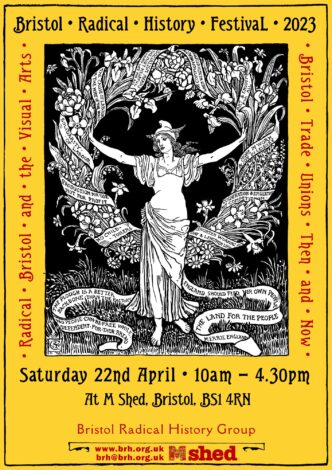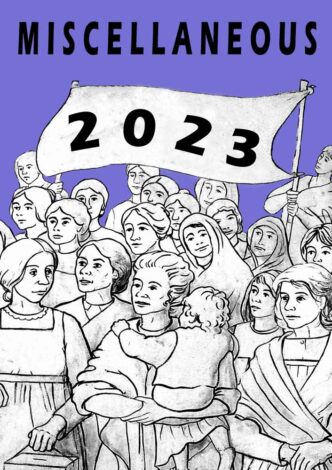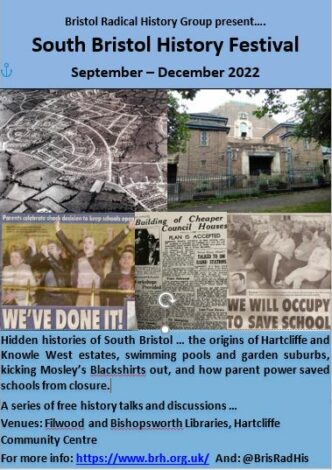The ‘Labour Revolt’ that swept Britain between 1910-14 was one of the most sustained, dramatic and violent explosions of industrial militancy and social conflict the country has ever experienced. It involved large-scale strikes by miners, seamen, dockers, railway workers and many others, and was dominated by unskilled and semi-skilled workers, many acting independently of trade-union officials. Amidst this powerful grassroots energy, the country saw widespread solidarity action, […]
Bristol Radical History Group presents an innovative exhibition of resistance to fascism in the city in the 1970s, through a collection of rare contemporary posters, badges, pamphlets, photographs and film. This visually powerful exhibition considers the role that Bristolians played in standing up to and confronting the rise of the far-right and racist National Front during the 1970s. The first warning came fifty years ago – the National Front decided to put up candidates in Bristol. The […]
‘Women’s Threads of Bristol’ aims to create a comprehensive visual illustration of places in Bristol that are named after women – roads, buildings, parks, blue plaques, murals – all are relevant. It encourages exploration of who these women were and what they did to earn recognition. But, just as importantly, it asks people to suggest who they think should be on the map. Who were our female community champions? Which women dedicated their lives towards science, health, teaching, equalities, the […]
The exhibition provides examples of the activism of Bristol Anti-Apartheid Movement (BAAM) in its campaign to raise awareness of the struggle against Apartheid in South Africa. Formed in 1964, BAAM was one of the largest local groups affiliated to the national Anti-Apartheid Movement. Material donated to the Bristol Archives and photographs from the Bristol Post Archive show the diverse range of activities over the group's 30 year history - pickets, boycotts, meetings, fundraising events such as […]
The Saint-Just Mob have been active subvertisers in Bristol since 2001 intervening on billboards, hoardings and statues using pasted words on lining paper. Part of the battle to free our Commons. Over that time around 10 comrades have contributed hands, ideas and ladders and acted as look-outs. Named after Antoine Saint-Just, co-drafter of the Franch Revolutionary Constitution of 1793 that included the abolition of slavery. The title is useful inasmuch that mention of Saint-Just riles anarchists […]
The unveiling of a blue plaque to Hilda Cashmore quaker, feminist, educator and social worker and the first warden of Bristol's Barton Hill Settlement will take place at 12.00 noon on International Women's Day, Wednesday, 8th March 2023 at Wellspring Settlement, 43 Ducie Road, Barton Hill BS5 OAX. Quaker, feminist, social reformer and educator, whose work led to her election as the first woman president of the British Association of Residential Settlements, Cashmore was one of a number of […]
This memoir written by Bristol trade union activist, Andy Danford, provides a rich account of the actions of rank-and-file trade unionists to improve the pay, conditions and job security of the British Aerospace workers in Bristol, culminating in a notable industrial and political struggle to convert the Filton arms factory to the production of socially useful products. Alas, this final campaign failed, and in his account, Danford reveals the complexities and political difficulties of achieving […]
7.00pm, Tues 13th December, Bishopsworth Library, Bishopsworth Rd, Bristol BS13 7LN In November 2014 the Bishop of Bristol, preaching to school students, claimed that ‘speculation’ about the ‘business roots’ of the city’s philanthropic icon, Edward Colston, was merely ‘speculation’. These incendiary words inspired new historical research into Colston’s slave-trading activities and the origins of his role as a ‘City Father.’ They also led to the formation of the campaign group Countering Colston […]
7.00pm, Weds 7th December, Bishopsworth Library, Bishopsworth Rd, Bristol BS13 7LN In October 2000, Bristol City Council announced that it was considering shutting Gay Elms and Whitehouse primary schools, because in its view there were too many surplus school places in the Withywood and Hartcliffe areas. Sally Miewa, acting head of Whitehouse primary and Jackie Ball, chair of Gay Elms’ Parents Teachers Association expressed shock and anger on hearing the news and immediately began to organise […]
7.00pm, Wednesday 30 November, Hartcliffe Community Centre, Hareclive Rd, Bristol BS13 0JW The talk will cover the conflicts around the building of Hartcliffe on the outskirts of Bristol. The promise of the original plans and the comparison with what was finally built. The talk will draw upon council documents, media reports and comments of local residents at the time. Paul Smith grew up and lived in Hartcliffe for over 30 years. He represented the area as a councillor from 1988-1999 and […]


